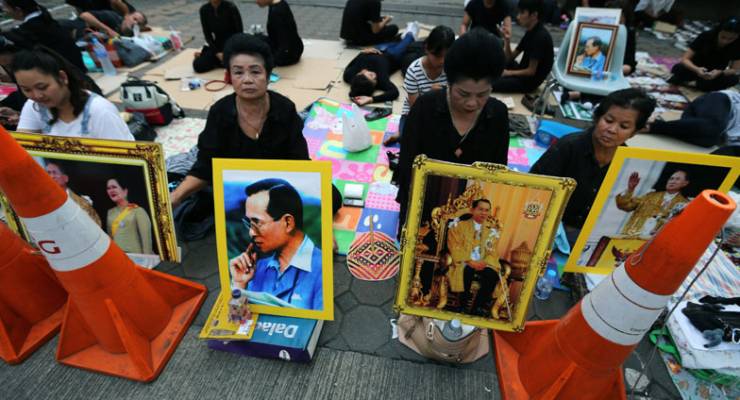
Thai women mourn the death of Bhumibol Adulyadej in Bangkok
Tension is again building in Thai politics following the death of the world’s longest-reigning monarch, King Bhumibol Adulyadej. The military government had been trying to dampen speculation on the imminence of the king’s condition because at stake is the whole orientation of Thai politics and economy.
Official reports confirmed that the 88-year-old king had suffered from renal failure and pneumonia and his death was expected.
In recent days there has been increased military and police activity in Thailand’s restive northern and north-eastern regions, which are the support bases of ousted prime minister Thaksin Shinawatra and his sister, ousted prime minister Yingluck Shinawatra.
Bhumibol has been in deteriorating health for several years. In the last two days, his family rushed to his bedside, along with self-appointed Prime Minister General (ret.) Prayut Chan-ocha. As well as paying their respects, it is expected that Prayut, who seized power in a military coup in 2014, has been negotiating the royal transition.
That the transition might be difficult follows mounting speculation about the king’s successor, given the long-standing unpopularity of Crown Prince Vajiralongkorn. The Crown Prince is close to deposed and exiled prime minister Thaksin Shinawatra.
[Thailand’s military rulers entrench their power]
Thailand’s military is deeply uncomfortable with the idea of the Prince ascending to the throne. His sister, Princess Sirindhorn, favored by the military, has been touted as an alternative. However, Prayut has confirmed that Crown Prince Vajiralongkorn will succeed to the throne.
At stake is the legitimacy of the Thai political system and the centrepiece of the Thai economy. In politics, Bhumibol was seen to legitimise, or deligitimise, elected governments and the coups that deposed them.
The king was, by definition, at the centre of the pro-royalist, pro-business, pro-military “yellow shirt” faction in Thai politics. However, he also commanded loyalty from much, if not all, of the “red shirt” opposition. The “red shirt” faction broadly represents Thailand’s economically dispossessed and rural constituency, from which the Shinawatra family has drawn support.
Under an open democracy, Thailand has returned pro-Shinawatra, pro-“red shirt” governments since 2001. These governments have directly challenged Thailand’s traditional elite control of politics and, thereby, control of the economy.
At the heart of the Thai economy, under the king’s former auspice, is the Crown Property Bureau, valued at between US$35 and US$53 billion. It is this, and its complex network of business associations, investments, underwritings and borrowings that tie in Thailand’s financial elite so tightly to the royal family.
[Thailand’s human trafficking industry is Australia’s problem]
The Thai military, with its own formal and informal business interests and more than eight decade-long association with and support for the Thai monarchy — seven decades of which have been with this king — is also directly tied into supporting the status quo. That may continue, despite the “status quo” changing.
Despite heightened political competition between Thailand’s “yellow shirt” and “red shirt” factions, it has been suggested that the 2014 coup was also about locking the country into place ahead of the king’s death. This political “lock” was manifested in the passage of the military-drafted constitution in August, which increases the military’s political role and under which political leaders are to be appointed rather than elected.
There is an old fable in Thailand that the Chakri Dynasty will end with the death of its ninth member. King Bhumibol is also known as Rama IX, being the ninth member of the Chakri Dynasty.
It is unlikely that fables have much to do with the practical evolution of Thai politics. But the story is told by ordinary folk, lending local credibility to the idea that, now the king has died, the country will face significant political change.
Now Bhumibol has died, Thailand’s Bangkok-centred elite will again face off against a dispossessed and angry majority. That majority will, in turn, be considering options, including confrontation, in response to a structurally unequal a political system that will have lost its one symbol of legitimacy.
*Damien Kingsbury is Professor of International Politics at Deakin University, and author of the just published Politics in Contemporary Southeast Asia: Authority, Democracy and Political Change (Routledge).








Crikey is committed to hosting lively discussions. Help us keep the conversation useful, interesting and welcoming. We aim to publish comments quickly in the interest of promoting robust conversation, but we’re a small team and we deploy filters to protect against legal risk. Occasionally your comment may be held up while we review, but we’re working as fast as we can to keep the conversation rolling.
The Crikey comment section is members-only content. Please subscribe to leave a comment.
The Crikey comment section is members-only content. Please login to leave a comment.